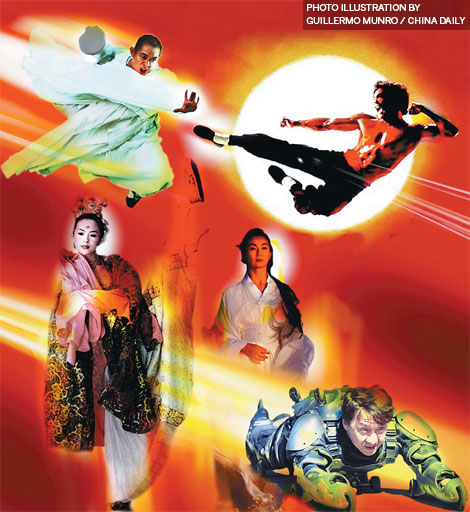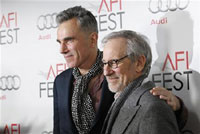Steering swordplay
Updated: 2013-01-11 10:39
By Raymond Zhou (China Daily)
|
|||||||||||

Wuxia classics are the glory of Chinese cinema and their heroes are very much like the Robin Hoods of the West. But Raymond Zhou finds new wuxia productions are often mediocre in concept and suggests that it will take a new mindset before a breakthrough can be achieved.
By most accounts, wuxia is the only film genre invented by Chinese-language cinema. You know it when you see it, but it is not quite easy to define. Wuxia is commonly known as martial arts or kung fu. Both these terms - the second coined in Hong Kong and spread to the rest of the country - describe the action, not the spirit. In that narrow sense, it is a kind of Chinese action film, usually set in ancient times. The Chinese word wuxia contains wu, meaning "martial" or "military" and referring to the action, and xia, roughly translated as "chivalry". As we all know, Chinese "chivalry" is very different from the Western code of conduct associated with the medieval institute of knighthood. For one thing, Lancelot's courting of Queen Guinevere has never been adapted into a Chinese play or film.
A typical wuxia movie combines the element of action with a moral code in a ratio the filmmaker sees fit. If you have 100 percent wu and no xia, you have a video of a martial-arts competition. If it's all xia without any wu, then it would be a courtroom drama or some other kind of drama.
Related: Even martial-arts films face competition in the West
Is it for real?
 |
There is a myth about wuxia action: Some would have you believe it's realistic while others claim it's all make-believe. You don't really need to be a martial artist to know the difference.
Many of the moves used in movies are based on real martial arts of various schools, but are no doubt exaggerated for dramatic purposes. As many Hong Kong filmmakers readily admit in media interviews, they are often more influenced by the dance sequences of Hollywood musicals of the 1950s-60s than by a particular method of Chinese martial arts.
The fact that three of Chinese cinema's greatest martial artists - Bruce Lee, Jackie Chan and Jet Li - are all solidly trained in real martial arts rather than movie exhibitions may give the wrong impression that what you see on the screen is the real McCoy.
The 1993 biopic Dragon: The Bruce Lee Story has a scene that depicts Lee finishing a complicated set of moves with no regard to camera angles and other film techniques for fragmented shooting. (Of course, this must have been apocryphal because Lee was a child actor before he became a kung fu legend and surely knew the requirements of filming.)
Related Stories
Foreign films lead Chinese box office 2013-01-10 13:46
'Lincoln' leads BAFTA film nominations with 10 2013-01-10 10:15
Film criticism not justified 2013-01-10 07:15
Even martial-arts films face competition in the West 2013-01-11 07:30
Micro Film Competition accepting submissions 2013-01-09 21:37
China is world's 2nd largest film market 2013-01-09 19:00
Today's Top News
Police continue manhunt for 2nd bombing suspect
H7N9 flu transmission studied
8% growth predicted for Q2
Nuke reactor gets foreign contract
First couple on Time's list of most influential
'Green' awareness levels drop in Beijing
Palace Museum spruces up
Trading channels 'need to broaden'
Hot Topics
Lunar probe , China growth forecasts, Emission rules get tougher, China seen through 'colored lens', International board,
Editor's Picks

|

|

|

|

|

|





